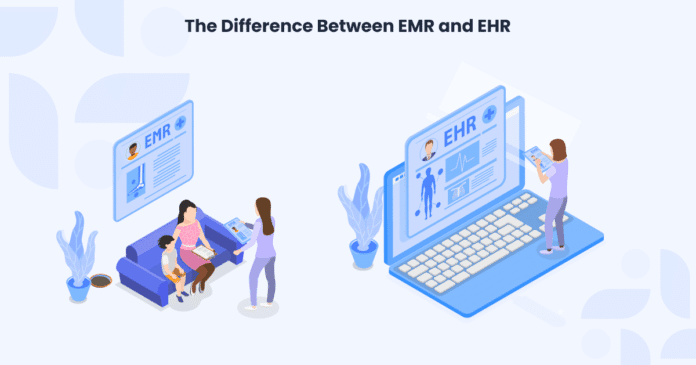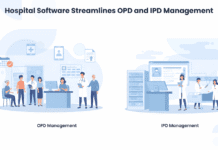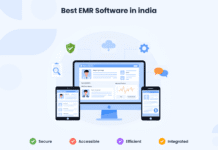
In healthcare, two terms often create confusion: EMR and EHR. Many people search for the difference between EMR and EHR, especially in India, where digital health adoption is growing fast. At first glance, they sound the same. Many people even use them as if they mean one thing. But the truth is, they are different, and knowing that difference can help doctors, clinics, and even patients make smarter choices.
Both EMR (Electronic Medical Record) and EHR (Electronic Health Record) are about moving away from paper files and making healthcare digital. The difference lies in how wide their reach is and how the information is used.
What is EMR? (Electronic Medical Record)
An Electronic Medical Record (EMR) is a type of digital medical records system. It is simply the digital version of the paper files a doctor used to keep. Instead of storing patient history, prescriptions, and treatment notes in thick folders, everything is now on a computer.
Key things to know about EMR:
- It belongs to one clinic or practice only.
- Doctors use it to track patient visits, prescriptions, test results, and medical history in that clinic.
- It saves time compared to manual record-keeping.
- The data usually stays within that one clinic and is not meant to travel outside.
Think of it this way: EMR is like a personal notebook for a single clinic. Helpful, fast, and reliable, but limited to one place.
What is EHR? (Electronic Health Record)
An Electronic Health Record (EHR) is bigger and broader. Compared to EMR, it’s designed for a connected healthcare system, making it essential when comparing EMR vs EHR in healthcare. It’s not just a record inside one clinic, it’s a complete digital profile of a patient’s health that can be shared across different healthcare providers.
Key things to know about EHR:
- It covers a patient’s health journey across multiple clinics, hospitals, labs, and pharmacies.
- It is built for sharing and connecting information between providers.
- It supports better coordination of care, for example, if one doctor prescribes something, another doctor in a different hospital can see it too.
- It is designed to meet compliance and government standards like ABDM in India or HIPAA in the US.
So, while EMR is limited to one clinic, EHR travels with the patient. It allows a smoother, more connected healthcare experience.
EMR vs EHR: Key Differences at a Glance
Here’s a simple comparison that makes it clear:
| Aspect | EMR (Electronic Medical Record) | EHR (Electronic Health Record) |
| Scope | Records inside one clinic or practice | Records that connect across providers |
| Data Sharing | Stays in the clinic | Built for sharing across healthcare |
| Accessibility | Limited to one location | Accessible across different systems |
| Compliance | Basic record keeping | Aligned with national and international standards |
| Best For | Individual doctors and small clinics | Hospitals, networks, and large practices |
P: In short, EMR = Local. EHR = Global.
EMR vs EHR: Pros and Cons
Both EMR and EHR have their strengths and their limitations. Understanding the benefits of EMR and EHR will help clinics decide which system fits their needs.
Pros of EMR
- Easy to set up and use.
- Speeds up prescriptions and record keeping in one clinic.
- A good first step for clinics moving away from paper.
Cons of EMR
- Data doesn’t travel outside the clinic.
- Not useful if patients see multiple doctors.
- Limited in long-term scalability.
Pros of EHR
- Provides a complete picture of patient health.
- Enables secure sharing across providers.
- Supports better coordination and reduces duplicate tests or prescriptions.
- Meets compliance requirements.
Cons of EHR
- More complex than EMR to set up.
- Needs training and sometimes system integration.
- It can cost more initially.
Do Hospitals Use EHRs or EMRs?
Most hospitals today use EHRs rather than EMRs. Here’s why:
- A hospital usually has multiple departments, specialists, labs, and pharmacies under one roof. To keep all of them connected, they need a system that allows smooth data sharing. That’s what EHRs are built for.
- Patients in hospitals often see more than one doctor. With an EHR, all those doctors can look at the same patient record, instead of keeping separate notes that never meet.
- Many hospitals are required to follow government standards for compliance and reporting. Since EHRs are designed to meet those standards, they are a better fit.
On the other hand, EMRs are more common in smaller clinics or single practices, where only one doctor or a small team handles patients and there isn’t much need to share data outside.
So, the short answer is:
For hospitals, the choice is clear: EHRs provide compliance, connectivity, and better care. For small clinics, EMRs can work initially, but upgrading later ensures they remain ABDM-compliant EMR/EHR systems in India’s digital healthcare ecosystem.
Which is Better for Your Practice?
This depends on the type of practice you run.
- If you’re running a small clinic that mostly serves repeat patients, EMR may be enough. It gives you digital speed without much complexity.
- If you’re running a hospital or multi-specialty practice, EHR makes more sense. It lets multiple doctors and staff members access and update the same patient records.
- For the long-term future, EHR is the better investment. Healthcare is moving toward connected systems, and clinics that adopt EHR now will avoid disruption later. This is why the question ‘EMR vs EHR: Which is better?’ has no one-size-fits-all answer it depends on the size of your practice and your goals.
Benefits of Electronic Health Records and EMRs in Healthcare
- Quick access: Doctors can see patient history in seconds.
- Fewer mistakes: Clear digital records reduce errors.
- Teamwork made easy: Records can be shared with labs, pharmacies, or other doctors.
- Safe & secure: Data is stored with encryption and privacy standards.
- Saves time & money: No paper files, no extra storage costs.
- Patient-friendly: Digital prescriptions, reminders, and easy access to records.
EMR vs EHR in India: The Future of Digital Healthcare
India is actively moving towards digital health, India is actively moving towards digital health, and the debate of EMR vs EHR in India is becoming more important than ever. The government’s Ayushman Bharat Digital Mission (ABDM) is building a framework where patients will have a unique digital health ID, and their health records can be accessed securely across the country.
This means:
- Clinics and hospitals will need systems that support interoperability.
- Patients will expect easier access to their records on mobile or online.
- Healthcare providers will be expected to use EHRs to stay compliant and competitive.
In this shift, EMR still plays an important role as the first step. Many clinics start with EMR Software to digitize their workflow, and later upgrade to EHR Software as they grow.
EMR is used in one clinic only. EHR can be shared between many hospitals and doctors.
Yes. Clinics can start with EMR and later move to EHR as they grow.
EHR helps doctors see a patient’s full health history and give better, faster care.
Yes, some software like Healcard offer both EMR and EHR in one system.
India is moving toward connected digital health under ABDM, making EHR the future standard.
EMR software for small clinics can start around ₹500–₹1,000 per month, while full-featured EHR systems for hospitals may range from ₹2,000–₹10,000+ per month, depending on features and users.
EHR is better for hospitals because it supports multi-department data sharing, patient tracking, and compliance with standards like ABDM in India or HIPAA in the U.S.
Conclusion
At the end of the day, the difference is simple:
- EMR is digital, but local.
- EHR is digital and connected.
If your clinic is just starting out, EMR can help you move away from paper. But if you’re thinking long term, EHR is where healthcare is heading.
With Healcard, you don’t have to choose one or the other. It gives you the benefits of both, making it the ideal digital medical records system for clinics and hospitals looking to stay ahead. Explore our EMR & EHR Software to make your practice faster, more compliant, and ready for the future.
Need help? Contact us at support@healcard.com




